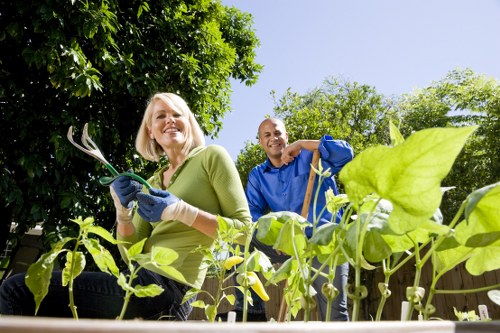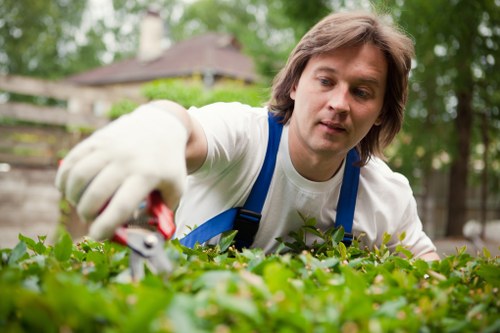Effective Driveway Algae Removal in Forest Hill

Driveway algae can be a persistent and unsightly problem for homeowners in Forest Hill. The combination of moisture, shade, and the right temperature creates a perfect environment for algae growth, making your driveway slippery and unattractive. Addressing this issue promptly not only enhances the curb appeal of your home but also ensures safety for you and your family.
Understanding the causes of driveway algae is the first step towards effective removal. Algae thrives in damp, shaded areas where sunlight is limited. Driveways made of porous materials like concrete or asphalt are particularly susceptible because they retain moisture longer. Additionally, organic debris such as leaves and twigs can accumulate, providing a nutrient-rich environment for algae to flourish.
Fortunately, there are several methods to combat driveway algae in Forest Hill. From natural remedies to professional services, homeowners have a variety of options to choose from. Each method has its own set of advantages, depending on the severity of the algae growth and the specific conditions of your driveway.

Natural Remedies for Algae Removal
Natural solutions are often preferred by homeowners looking for eco-friendly and cost-effective ways to remove algae from their driveways. These methods utilize common household items and environmentally safe practices to eliminate algae without harming the surrounding flora and fauna.
Baking Soda and Water: A simple mixture of baking soda and water can effectively scrub away algae. Apply the solution generously to the affected areas and let it sit for about 20 minutes before scrubbing with a stiff brush. Rinse thoroughly with water to prevent residue buildup.
Vinegar Spray: White vinegar is a powerful natural disinfectant. Mixing vinegar with water in a 1:1 ratio creates a potent algae-killing solution. Spray this mixture onto the algae-covered driveway, allow it to sit for 15-20 minutes, and then scrub and rinse.
Steam Cleaning: Utilizing a steam cleaner can kill algae spores without the need for chemical agents. The high temperature of the steam penetrates the driveway surface, effectively removing algae and other organic matter.

Chemical Solutions for Algae Removal
When natural remedies are insufficient, chemical solutions can provide a more robust approach to algae removal. These products are specifically formulated to target and eliminate algae, ensuring a clean and safe driveway surface.
Algaecides: Commercial algaecides are available in liquid or granule form. These products contain active ingredients that break down algae cells, preventing regrowth. It's essential to follow the manufacturer's instructions carefully to ensure effective and safe application.
Bleach and Detergent Mixture: A mixture of bleach and detergent can be highly effective in removing algae stains. Combine one part bleach with three parts detergent and apply the mixture to the affected areas. Allow it to sit for 10-15 minutes before scrubbing and rinsing thoroughly with water.
Pressure Washing with Chemical Detergents: Combining pressure washing with chemical detergents enhances the cleaning power, ensuring deep penetration into the driveway surface. This method is particularly effective for stubborn algae stains and heavy growth.

Preventive Measures to Keep Algae at Bay
Prevention is always better than cure. Implementing effective preventive measures can significantly reduce the likelihood of algae regrowth on your driveway. These strategies focus on minimizing the conditions that favor algae proliferation.
Improve Drainage: Ensuring proper drainage around your driveway prevents water from pooling, which can create a damp environment ideal for algae growth. Consider grading your driveway to direct water away and installing drainage systems if necessary.
Increase Sunlight Exposure: Trim overhanging branches and remove any obstructions that limit sunlight exposure. More sunlight reduces moisture levels and inhibits algae development.
Regular Cleaning: Routine cleaning of your driveway removes organic debris and prevents the accumulation of materials that can serve as algae food sources. Sweep your driveway regularly and remove leaves, moss, and other debris promptly.
- Seal your driveway to create a barrier against moisture.
- Use algae-resistant sealants for long-term protection.
- Address any cracks or damage promptly to prevent moisture infiltration.

Professional Algae Removal Services in Forest Hill
For those who prefer a hands-off approach or have severe algae problems, hiring professional algae removal services in Forest Hill is a viable option. These experts have the necessary equipment and expertise to tackle even the most stubborn algae infestations.
Professional services typically offer comprehensive solutions, including inspection, cleaning, treatment, and preventive measures. They use advanced techniques such as high-pressure washing, specialized chemical treatments, and sealing applications to ensure thorough and lasting results.
Choosing a reputable service provider ensures that the job is done efficiently and safely. Professionals are knowledgeable about the best practices and can tailor their approach to suit the specific needs of your driveway, taking into account the local climate and conditions of Forest Hill.
Moreover, investing in professional algae removal can save you time and effort, allowing you to enjoy a clean and safe driveway without the hassle of DIY methods.
Nearby Areas for Algae Removal Services
Forest Hill is surrounded by several neighboring areas where residents can also access top-notch algae removal services. These areas benefit from similar climates and conditions, making algae removal equally pertinent.
- Carthage: Just a short drive from Forest Hill, Carthage offers a range of professional algae removal services tailored to residential driveways.
- Glenview: Known for its well-maintained neighborhoods, Glenview residents often seek algae removal to preserve their home's appearance.
- Lake Forest: With its scenic landscapes, Lake Forest emphasizes maintaining clean and algae-free driveways to enhance property aesthetics.
- Travis Heights: This area has several service providers specializing in eco-friendly algae removal solutions.
- Pinehurst: Pinehurst offers both DIY solutions and professional services for effective algae management.
- Meadowbrook: Meadowbrook residents benefit from local experts who understand the specific challenges of algae removal in the area.
- Riverdale: Riverdale's proximity to water bodies makes algae control a regular maintenance task for homeowners.
- Sunnyvale: Sunnyvale provides innovative algae removal techniques to keep driveways pristine.
- Maplewood: Maplewood's community-focused approach ensures residents have access to reliable algae removal services.
- Brookside: Brookside combines traditional and modern methods to effectively manage driveway algae.
Choosing the Right Algae Removal Method
Selecting the appropriate algae removal method depends on various factors, including the extent of algae growth, the type of driveway surface, and your personal preferences regarding eco-friendliness and cost.
For minor algae stains, natural remedies like baking soda and vinegar may suffice. These methods are not only safe for the environment but also cost-effective. They are ideal for homeowners who prefer maintaining their driveways without the use of harsh chemicals.
However, for more severe infestations, chemical solutions or professional services might be necessary. Chemical treatments offer a more powerful and immediate solution, while professional services ensure a thorough and long-lasting result. Professionals also provide added benefits like sealing and preventive measures, which can extend the cleanliness and safety of your driveway.
It's important to consider the long-term effects of each method. Natural remedies may need to be reapplied periodically, whereas chemical treatments and professional services can offer more durable solutions. Additionally, homeowners should assess the environmental impact of each method, opting for eco-friendly options whenever possible.
Safety Considerations During Algae Removal
When undertaking algae removal, whether through DIY methods or professional services, safety should be a top priority. Proper handling of cleaning agents and equipment ensures that the process is not only effective but also safe for you and your family.
Protective Gear: Always wear protective gloves, eyewear, and appropriate clothing when using chemical solutions. This prevents skin irritation and exposure to harmful substances.
Ventilation: If working in enclosed areas or using strong chemicals, ensure adequate ventilation to avoid inhaling fumes.
Proper Storage: Store all cleaning agents and equipment in a secure place, away from children and pets, to prevent accidental ingestion or misuse.
Equipment Safety: When using machinery like pressure washers, follow the manufacturer's instructions carefully. Improper use can lead to injuries or damage to your driveway surface.
Environmental Protection: Be mindful of runoff water containing cleaning agents. Use environmentally friendly products when possible to minimize the impact on surrounding plants and waterways.
Maintaining a Clean Driveway After Algae Removal
After successfully removing algae from your driveway, maintaining its cleanliness is crucial to prevent future growth. Regular upkeep not only keeps your driveway looking great but also extends its lifespan.
Develop a routine maintenance schedule that includes sweeping, washing, and inspecting your driveway for any signs of algae recurrence. Promptly address any cracks or damage to prevent moisture from seeping in and facilitating algae growth.
Consider applying a driveway sealant after algae removal. Sealants create a protective barrier that repels water and inhibits algae development. This additional layer of protection can significantly reduce the need for frequent cleaning and maintenance.
Additionally, managing the surrounding environment plays a role in driveway maintenance. Trim back vegetation that casts shadows on your driveway, and ensure that gutters and drainage systems are functioning correctly to divert water away.
- Regularly inspect and repair driveway cracks.
- Keep the driveway free from organic debris.
- Monitor moisture levels and address leaks promptly.
- Use eco-friendly cleaning methods to maintain a healthy environment.
Cost Considerations for Algae Removal
The cost of algae removal in Forest Hill can vary based on the chosen method, the size of the driveway, and the severity of the algae growth. Understanding the potential expenses involved helps homeowners make informed decisions that align with their budget and needs.
DIY Methods: Natural remedies like baking soda, vinegar, and basic cleaning supplies are relatively inexpensive. The total cost for these materials typically ranges from $20 to $50, depending on the size of the driveway and the extent of algae contamination.
Chemical Treatments: Commercial algaecides and specialized detergents are more costly than natural remedies. Prices can range from $50 to $150, depending on the brand and the quantity required to treat the driveway effectively.
Professional Services: Hiring a professional algae removal service in Forest Hill is the most expensive option but offers comprehensive and long-lasting results. Costs can range from $150 to $500, depending on the size of the driveway, the complexity of the job, and the specific services included, such as sealing and preventive treatments.
While professional services have a higher upfront cost, they can save time and provide a more thorough solution, potentially reducing the need for frequent maintenance and additional expenses in the long run.
Environmental Impact of Algae Removal
Algae removal methods can have varying impacts on the environment. It's essential to consider these effects when choosing the best approach for your driveway in Forest Hill.
Natural Remedies: Using eco-friendly solutions like baking soda and vinegar minimizes environmental impact. These substances break down naturally and do not harm plants, animals, or water sources when used responsibly.
Chemical Treatments: While effective, chemical algaecides can pose environmental risks if not applied carefully. Runoff can contaminate nearby plants and waterways, affecting local ecosystems. To mitigate these risks, opt for biodegradable and non-toxic products whenever possible.
Professional Services: Reputable algae removal professionals prioritize environmentally safe practices. They use advanced techniques to minimize runoff and utilize eco-friendly products. Additionally, professionals can provide guidance on maintaining a healthy driveway with minimal environmental impact.
Overall, choosing environmentally responsible algae removal methods preserves the natural beauty of Forest Hill and protects the local ecosystem.
Seasonal Considerations for Algae Control
Algae growth is influenced by seasonal changes, making it important to adjust your algae control strategies throughout the year. Understanding how different seasons affect algae development can help you maintain a clean and safe driveway in Forest Hill.
Spring: With the increase in rainfall and warmer temperatures, algae growth tends to surge in spring. This is an ideal time to perform a thorough cleaning and apply preventive measures like driveway sealing.
Summer: Summer's heat and occasional droughts can reduce algae growth, but intermittent rain and high humidity can still pose challenges. Regular inspections and maintenance help keep algae at bay during this season.
Autumn: Falling leaves and increased moisture in autumn create favorable conditions for algae. Promptly remove organic debris and ensure proper drainage to prevent algae proliferation.
Winter: Cold temperatures can slow down algae growth, but melting snow and ice can create damp surfaces once temperatures rise. Use safe, environmentally friendly de-icing agents that do not contribute to algae growth.
Adapting your algae removal and prevention techniques to each season ensures continuous protection and a well-maintained driveway throughout the year.
Conclusion
Algae on your driveway in Forest Hill is more than just a cosmetic issue; it can pose safety hazards and reduce your property's value. By understanding the causes of algae growth and employing effective removal and prevention strategies, you can maintain a clean and safe driveway all year round.
Whether you choose natural remedies, chemical solutions, or professional services, taking proactive steps ensures that your driveway remains free from algae. Additionally, implementing preventive measures and regular maintenance can significantly reduce the likelihood of future growth, saving you time and effort in the long run.
Investing in the upkeep of your driveway not only enhances your home's appearance but also contributes to the overall safety and longevity of the surface. Embrace the various methods available and choose the one that best fits your needs and preferences to keep your Forest Hill driveway pristine.
Frequently Asked Questions
- How often should I clean my driveway to prevent algae growth?
Regular cleaning, at least twice a year, helps prevent algae buildup. Additionally, promptly removing organic debris and addressing moisture issues can reduce the chances of algae growth.
- Are there eco-friendly products available for algae removal?
Yes, there are several eco-friendly algae removal products on the market. Natural remedies like vinegar and baking soda are also effective and environmentally safe options.
- Can algae damage my driveway surface?
While algae itself doesn't directly damage the driveway, it can make the surface slippery and dangerous. Moreover, the presence of algae often indicates moisture retention, which can lead to cracks and other structural issues over time.
- Is professional algae removal worth the investment?
Professional algae removal ensures thorough cleaning and provides long-lasting results. It is particularly beneficial for severe algae infestations and offers additional services like sealing and preventive treatments, making it a worthwhile investment.
- What preventive measures can I take to minimize algae growth?
Improving drainage, increasing sunlight exposure by trimming vegetation, regular cleaning, and applying driveway sealants are effective preventive measures to minimize algae growth.


